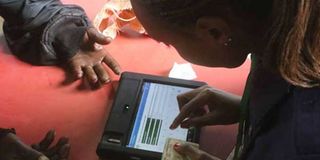Right to information, elections pivotal in nurturing democracy

An IEBC clerk verifies a voter on a Kiems kit at Nyeri Health Centre in Nyeri Town during the on October 26, 2017 elections. PHOTO | JOSEPH KANYI | NATION MEDIA GROUP
What you need to know:
- The IEBC was compelled to publish the KPMG audit report on the IEBC voter register.
- The figure was not guided by any law because the regulations are not yet ready.
Following the August 8 General Election and the two presidential poll petitions, the right to access the information held by the State and its bodies has come to the fore in the discourse on good governance.
During the first presidential poll petition, the Supreme Court ordered the Independent Electoral and Boundaries Commission to open its servers to the parties in the suit in the ‘read-only’ form.
In the second petition, the Supreme Court again ordered the IEBC to provide the petitioners with the full voter register. On November 8, the High Court ordered the Presidential Delivery Unit to disclose the money used in advertising the Jubilee government’s achievements based on a request by Katiba Institute, a constitutional research and policy NGO.
IEBC
The right to information enshrined under Article 35 of the Constitution of Kenya, grants citizens’ access to information held by the State; another person or entity that is necessary for the protection of one’s’ rights or fundamental freedoms.
Public bodies such as the IEBC are bound by Article 10 and Article 232 on national values and principles of governance regarding transparency, accountability and provision to the public of timely, accurate information.
The citizens have a right to know what the government and its organs are doing on their behalf.
This is why before the elections, the IEBC was compelled to publish the KPMG audit report on the IEBC voter register.
Access to information underpins the values of good governance, integrity, transparency and accountability and other values set out in Article 10 of the Constitution.
It is based on the understanding that without information the higher values of democracy, rule of law, and social justice cannot be achieved. Without these ideals and values, even elections become useless.
LEGITIMATE
However, the right to information may be limited under certain circumstances.
A public body may deny a citizen access to information if this concerns a legitimate, protected interest; if disclosure threatens substantial harm.
One cannot, for instance, request the Counter Terrorism Police to provide a list of its undercover agents or its informants because that might jeopardise or compromise national security.
However, one can request and get information on issues such as budgets, tenders, expenditure, disciplinary actions, successes and failures, even if it might embarrass or expose. Access procedures, including the fees charged, should be simple and easily accessible.
The Access to Information Act was passed in August, 2016 after a long push by civil society organisations. It underlined commitment to promote transparency and accountability within government.
It was one of the statutes required by the 2010 Constitution.
In the second presidential election petition, the IEBC has demanded a whopping Sh80 million from petitioners to photocopy the voter register.
TECHNOLOGY
The figure was not guided by any law because the regulations are not yet ready.
The Cabinet Secretary in charge of Information Communication Technology urgently needs to formulate the regulations that prescribe fees, narrow exemptions, broaden the scope of disclosure by the Executive, articulate on issues of formats of information given, record keeping by public entities, accuracy of information and complaints procedures.
A free media, being champion of freedom of expression and a source of facilitating access to information to citizens, has a huge part to play in ensuring citizens make informed choices.
There cannot be accountability when citizens and journalists do not have access to certified information, held by government departments.
Most importantly, access to information is instrumental in that it allows citizens to claim their rights - in that one cannot claim rights that one does not know exist.
Mr Kiprono is a senior legal officer, Article 19 Eastern Africa. [email protected] Twitter: @kipdemas Website: www.demasvox.com





